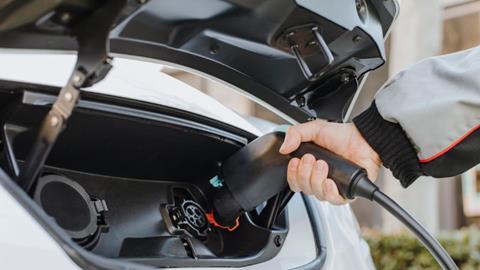The government has launched funding for schools and councils to install electric vehicle (EV) charging infrastructure as well as a consultation to look at ways to speed up chargepoint installation across the country.
Launched today (5 February) by technology and decarbonisation Minister Anthony Browne, the measures will see a new grant providing up to 75% of the cost to buy and install chargepoints, up to £2,500 per socket, up from the previous £350.
Paid for by the DfT, the grant forms part of the Workplace Charging Scheme and is available for state-funded schools, colleges, nurseries and academies to boost the chargepoint facilities for staff and visitors. Schools will also be able to generate revenue by making their chargepoints available to the public.
The schools grant is for state-funded schools and education institutions which must have dedicated off-street parking facilities – applications can be made online. Independent schools may apply for funding through the Workplace Charging Scheme and electric vehicle infrastructure grant for SMEs.
The government is also delivering the £381m Local Electric Vehicle Infrastructure (LEVI) Fund to local authorities across the country.
Councils receiving the first capital payments for charging projects are Bedford, East Sussex and North Yorkshire, as well as the London Boroughs of Hackney and Hounslow, bringing the total funding for these areas to more than £14.2m.
The funding will support the installation of thousands of new chargers.The LEVI Capability funding has also seen almost 100 dedicated EV officers recruited to support chargepoint procurement.
To aid local authorities in building a skilled workforce and delivering their charging projects, the government is also launching the electric vehicle infrastructure (EVI) training course for their officers, which will open to all local authorities from mid-March following a successful trial.
Technology and decarbonisation Minister Anthony Browne said: “We’re getting on with delivering our Plan for Drivers, and this latest set of measures will mean EV owners everywhere benefit from easier and more convenient access to chargepoints.”
Fully electric vehicles now account for over 16% of the new UK car market in 2023, according to industry statistics. The number of plug-in vehicles in the UK has also risen to over 1.2 million, of which 770,000 are fully battery-electric. So far 53,000 public chargepoints have been installed across the UK.
New laws recently came into force to provide EV drivers with easier and more reliable public charging, mandating that prices across chargepoints are transparent, easy to compare and that a large proportion of new public chargepoints have contactless payment options.
Baroness Barran, DfE Minister for the school system and student finance, said: “This is an exciting opportunity for schools across England to become part of an ongoing move towards a greener public sector. Schools engaging with this grant will be supporting the development of green infrastructure, helping to improve their local environments.
“Developing a greener education estate is a key element of our Sustainability and Climate Change Strategy. The expansion of this grant supports our ambition to improve the sustainability of our schools in the ongoing move towards net zero.”
In addition, the government is today launching a consultation to look at ways to speed up chargepoint installation across the country. The proposals would give EV chargepoint operators the right to carry out street works using a permit rather than a licence.
Permits can be issued much faster, taking days instead of months, and are significantly cheaper to obtain than licences, reducing costs for operators and speeding up the chargepoint rollout for drivers.
While the consultation runs, a new good practice guide has been published by the government to improve consistency in processing licence applications across different areas.
These are the second package of measures delivered from the government’s Plan for Drivers, and follow last month’s announcement of a crackdown on disruptive roadworks and better digital information to boost sat-nav accuracy.
The government will also shortly consult on removing the 2-metre limitation so that wall-mounted outlets and upstands can be installed anywhere within an area lawfully used for off-street parking.
These measures follow the recently launched zero emission vehicle (ZEV) mandate which requires 80% of new cars and 70% of new vans sold in Great Britain to be zero emission by 2030.









![Mercedes-Benz_eActros_600_(1)[1]](jpg/17820_mercedesbenz_eactros_600_11_978080.jpg)









![Panattoni 770 Central A1(M) CGI [81191]](jpg/19553_panattoni770centrala1mcgi81191_948403-2.jpg)